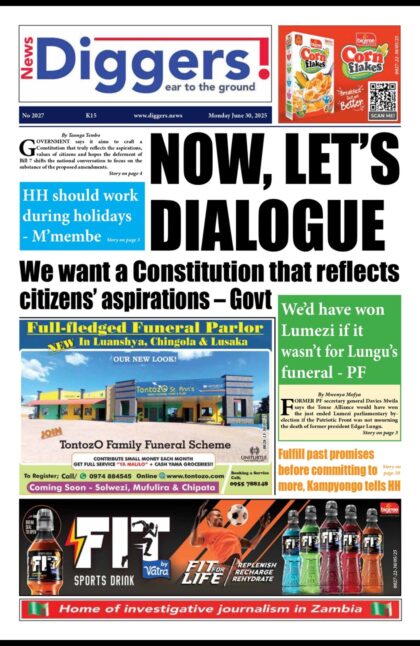PARENTS give their children different names for various reasons. Some do so to honor their relatives or remember an important event in their lives. Others just pick any common name in their tribe and give it to their child. Still others get their ‘Christian’ name at baptism as a sign of conversion to the new religion.These ‘Christian names, more often than not, have English rendering like Peter, John, Mary, Sara and so on.
When I was growing up it was common to change your name from a vernacular one to something ‘English.’ This was so because vernacular names were considered ‘villagish ’ and hence ‘inferior’ to foreign ones; and so to be accepted by our peers we would even change our names to sound ‘English.’ Mukelebai, for example would be changed to Muke, or Chileshe to Chile. And sometimes it was our white masters who couldn’t pronounce African names who gave us their European variants so as to accommodate us.
We also have nicknames. These are names to show one’s characters or attributes. They could be self-enacted or given by others. Sometimes nicknames could be used to taunt you by your peers for one reason or another. Again some people are given nick names for their outstanding performance in their field or craft. Kalusha Bwalya, the 1988 African footballer of year was called Great Kalu for his exploits on the football pitch. For some bad reason people may call you a name in your absence as a mockery.
Similarly we have stage names or pennames. This is common by our friends in the entertainment industry who want to add color and flavor to their talents. Such a name works to improve their image or help to sale their shows.
But I’m glad to say that many parents today are giving their children vernacular names, and this is as it should be.Why should the whole paramount chief have the first three names in English and his surname in vernacular? We are no longer under colonial rule! Mulekutika?
But then let’s just ask, what’s in a name? Many people would tell you that names have influence and you don’t just name your child anything. Some names mean bad luck, like Mabvuto (problems). Others suggest poverty or lack and still others point to a bleak future.
Nowadays, however, I’m seeing many children with vernacular names that have a very positive coloring to it. Mapalo and Chimwemwe are someof them. The more religious parents are even plucking names from the Bible to give to their children. I have in mind names like Shalom (which means peace) Thehila, Praise and others. At a glance you’d feel like we have all become Jews!
A Ngoni friend of mine wanted me to change my name– Chilufya, because, according to him, the name has a negative connotation.Whether he was just playing chimbuya or was one of those people who think that names can make or break someone, I disagreed with him. Why do we have so many Chilufyas who are so successful, some to have even ascended to the highest office of the land? I have four children who bear Chilufya as surname and three of them have scored distinction at grade twelve and are all in institutions of higher learning.While I agree that names have a bearing on people’s lives, I may be reluctant to say a name would break or make someone. If you are looking for meaning in a name, you’ll not find it. Instead you must give meaning to your name. How do you do that? Make your child believe in themselves and help build their character. Of course you cannot call your child ‘imbwa’ (dog) because that would make friends mock them. But a name like Chilufya can be great, as it is, especially if backed by positive thinking, self-determination, encouragement from parents and a belief in God who see beyond names.
I must also mention that it’s good to continue using names that are common in your tribe or family, because that helps to keep your heritage. The British royal family, for example, will always have names like Annie, Henry, Elizabeth, Victoria, Edward, etc.,
Zambia has some of the most wonderful names in the world. Courtesy of Facebook, I stumbled upon some beautiful Luvale names, some of which I share below:
Chisola, meaning hard work. Sombo, meaning angel, Musole -sweet fruit, Kaumba- inventor; Kakoma a name close to royalty. Kayombo, meaning brave. Kheke- mercy. Kuunda – peace…and many more. Of course we can add to this list name like Mutale, Sililo,Yande, Monde, Chikondi, Mutintaand so on and so forth. So here you are. Why import a name from Europe or Israel when we have a whole list of wonderful names to choose from?
I repeat, as I conclude; if you are looking for meaning in a name, you won’t find it. Instead give meaning to your name.
For comments:
Whatsapp +260 97 2 777 285
Email: [email protected]



















